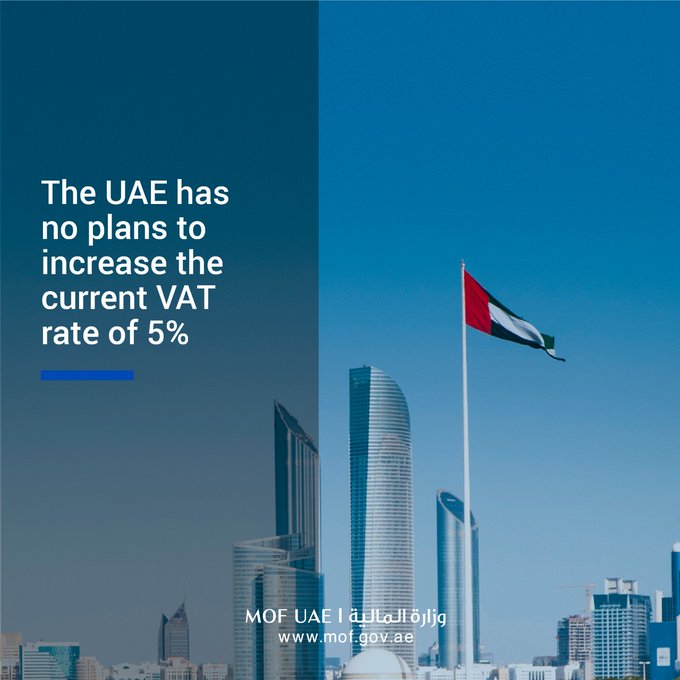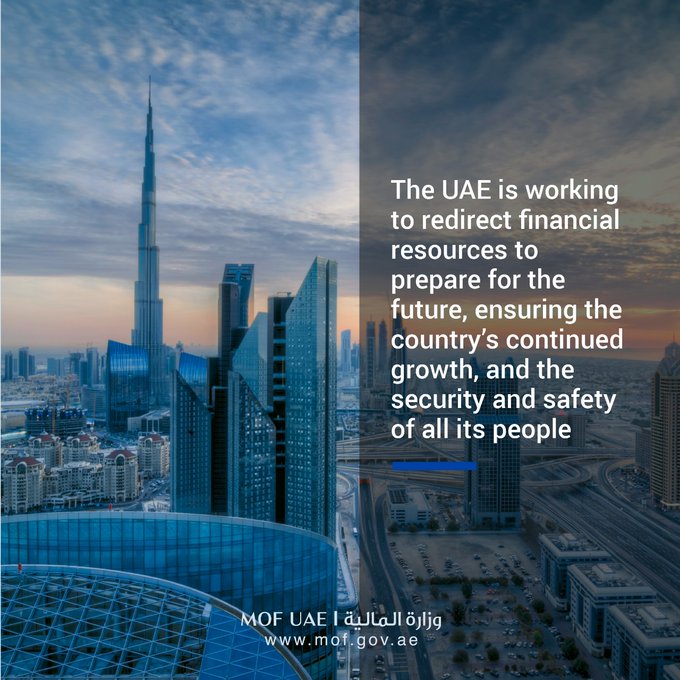نفت وزارة المالية وجود أي خطط في الوقت الراهن لرفع ضريبة القيمة المضافة في دولة #الإمارات العربية المتحدة والمفروضة حالياً بنسبة 5%، مؤكدة التزامها بتحقيق مستهدفاتها وخططها التنموية المعتمدة. @MOFUAE
Combating coronavirus: UAE businesses seek VAT waiver for a year to stimulate demand
VAT relief will stimulate demand for consumer goods in the country.
Private and family owned businesses in the UAE have requested the government to waive off value-added tax (VAT) for six months to one year in order to help stimulate demand in the economy.
A letter sent by family-owned business groups to Dubai Supreme Fiscal Committee have suggested establishing a private-public sector committee, reducing VAT from five per cent to two per cent, eliminating licensing fee, accelerating payment to suppliers and contractors, freezing of 2.5 per cent market fee, 50 per cent reduction in customs fees and water and electricity in order to help them overcome Covid-19 impact.
Rizwan Sajan, chairman and founder of Danube Group, said demand is slow across all the sectors due to job losses and salary cuts, therefore, VAT relief will stimulate demand for consumer goods in the country.
“This, in turn, will help businesses and the overall economy. Importantly, many countries around the world have also offered tax sops to businesses and consumers. Since VAT is the only consumer tax applied here, and waiving off this tax can stimulate demand. We request government to consider it on a priority basis. We are quite confident that this step will expedite the recovery of the UAE economy as country reopens. Moreover, we also requested waiver on utility and telecom charges,” said Sajan.
On Monday, May 11, the UAE’s Ministry of Finance announced that it will not increase VAT after Saudi Arabia tripled it to 15 per cent.
Rajiv Raipancholia, CEO of Orient Exchange, said remittances have dropped by 30 to 40 per cent and there are job losses and reduced salaries due to Coronavirus impact.
“A waiver of VAT till year-end would support the end-consumer in terms of reduced expenses to make ends meet. At the same time, landlords need to give a rent free period of two to four months to retailers otherwise the brick-and-mortar model will face huge challenges of continuity,” said Raipancholia.
Suresh Kumar, Chairman of the Indian Business and Professional Council (IBPC), said it is good if the businesses start to do well as a result of these measures because the amount of VAT collection after 6 months will more than offset loss of revenues for the government when business activity picks up.
“It is certainly worthwhile as businesses are operating on thin margins and with social distance in place at workplace, the cost will go up. So any such relief that businesses will get is good. I think six months of VAT waiver is a good period. It will give businesses an opportunity to restart their operations in fulls swing,” he said.
He suggested that sector-specific should be taken that will have better and strong impact on those sectors. “We have been regularly communicating and authorities are also actively participating,” he added.
Source:https://www.khaleejtimes.com/coronavirus-pandemic/combating-coronavirus-uae-businesses-seek-vat-waiver-for-a-year-to-stimulate-demand
UAE rules out any change in VAT rate after Saudi hikes it to 15%
In a surprise move on Monday, Saudi Arabia increased VAT threefold to 15 per cent.
The UAE’s Ministry of Finance (MoF) ruled out any plan to hike value-added tax (VAT) following Saudi Arabia’s announcement of a three-fold increase in VAT on Monday.
VAT was introduced in the UAE on January 1, 2018 at five per cent on several goods and services.
Younis Haji Al Khoori, Undersecretary of MoF, said the focus is to work with all government entities to assess the priorities for the post-Covid-19 stage. Furthermore, the ministry will reorient the financial resources to prepare for the future and continued growth to ensure the security and safety of the communities.
In a surprise move, Riyadh increased VAT rate from five per cent to 15 per cent and also suspended the cost of living allowance to increase revenues with effect from June 1, 2020.
Sources and industry executive privy to the matter said that contrary to the Saudi move, the UAE was mulling dropping VAT temporarily until the situation surrounding Covid-19 is stabilised and the economy returns back on track.
Also, many European and Asian countries are turning to emergency tax breaks to support their economies against the Covid-19 threat. India, China, Finland, South Africa, Bulgaria, the US and the EU have announced some form of relief for their businesses and consumers in taxes to cope with the virus.
“We at the MoF are studying our financial systems to ensure their readiness to manage the next stage and support all vital sectors. We are devising several programmes and projects to enhance our ability to continue the development process and to put people as our top priority. This is essential to build a secure future and achieve the well-being and stability of our society. The UAE has always been keen to take precautionary measures and launch financial initiatives, which protect the national economy and support various business sectors in the country,” said Al Khoori.
The #UAE has taken exceptional measures to contain the effects of the global #coronavirus #pandemic that has affected even the largest economies, to protect its economy & reduce the economic repercussions of the crisis on the business sector & on various sectors of society.
Analysts told Khaleej Times that increasing VAT would hurt the UAE’s non-oil sectors and also dampen consumer confidence at a time when the governments around the world are trying to stimulate demand to boost economies.
Khatija Haque, head of Mena Research at Emirates NBD, said hiking VAT in the UAE would be counterproductive as the emirate’s budget commitments are not as large as Saudi Arabia’s.
“While we do expect the UAE’s budget deficit to register a significant deficit of around 10 per cent of GDP in 2020, this follows two years of budget surpluses. Raising VAT in the UAE at a time when consumers are already struggling with layoffs and paycuts and businesses have seen demand contract severely would be counterproductive. It would not raise non-oil revenue significantly and further weigh on already weak aggregate demand,” she said.
Source:https://www.khaleejtimes.com/business/vat-in-uae/uae-rules-out-any-change-in-vat-rate-after-saudi-hikes-it-to-15-
UAE, Bahrain unlikely to follow Saudi in hiking VAT: Experts
In a surprise move on Monday, Saudi Arabia increased VAT threefold to 15 per cent and also suspended the cost of living allowance to increase revenues.
The UAE and Bahrain are unlikely to follow Saudi Arabia in increasing value-added tax (VAT), says tax experts.
In a surprise move on Monday, Saudi Arabia increased VAT threefold to 15 per cent and also suspended the cost of living allowance to increase revenues.
“Cost of living allowance will be suspended as of June 1, and VAT will be increased to 15 per cent from 5 per cent as of July 1,” the Kingdom’s state news agency said on Monday.
Mayank Sawhney, managing director at MaxGrowth Consultancy, said the Kingdom’s move will prompt a discussion in the UAE and other neighbouring countries to increase the VAT rate in their respective countries.
“However, any such move could be detrimental to businesses and consumers in these countries, who have already been adversely impacted by coronavirus. Therefore, it is unlikely that the authorities in UAE and Bahrain will increase the VAT rates at this stage,” said Sawhney.
An official response from the UAE’s Ministry of Finance was awaited at the time of publishing this report online. The UAE had previously announced that it will not increase VAT for the next few years.
Sources and industry executive said that contrary to the Saudi move, the UAE was mulling dropping VAT temporarily until the situation surrounding Covid-19 is stabilised and economy returns back on track.
In fact, many European and Asian countries are turning to emergency tax breaks to support their economies against the Covid-19 threat. India, China, Finland, South Africa, Bulgaria, the US and the EU have announced some form of relief for their businesses and consumers in taxes to cope with the virus.
Anurag Chaturvedi, CEO, Chartered House Tax Consultancy, says considering current situation surrounding the pandemic and its impact, it will not be favourable decision to increase taxes.
“GCC governments are providing stimulus to support businesses against Covid-19 and any increase in taxes will reverse the effect and may result in deeper recession with increased inflation. KSA has more internal demand and can sustain the increased taxes whereas other GCC countries are more dependent on sectors like tourism, global trade and logistics etc. which will become unattractive by increasing tax,” added Chaturvedi, who is also secretary for ICAI – Dubai chapter.
Thomas Vanhee, partner at Aurifer Middle East Tax Consultancy, believes that the UAE and Bahrain could follow KSA given the similarities in their economic conditions but the UAE has different dynamics as compared to other countries.
“Given the similarity and the interdependency of the KSA economy with the UAE and Bahrain, it is not inconceivable that these countries will follow suit. The situation of the UAE may be slightly different since it is a confederation and not a unitary state. The dynamics between the Emirates may play out differently,” said Vanhee.
Impact of increasing VAT
Vanhee added that a hike in the VAT rate will impact consumer confidence.
“From a business perspective, those businesses which may have cared less about a mere 5 per cent VAT, will now increasingly turn their attention to transactions subject to VAT to ensure compliance and, more importantly, no VAT leakage. The economy is currently in a fragile state, therefore, this measure will be carefully weighed.”
Sawhney of MaxGrowth Consultancy noted that the increase in VAT rates in UAE in the current environment is going to have a significant adverse impact on businesses and consumers in the country.
“It could prompt exodus of more people from UAE, as such move will increase the cost of living while many people struggle to cope up with given their reduced income in the current environment on account of Covid-19,” said Mayank.
Anurag Chaturvedi noted that the impact of hiking VAT will depend on the size of the increase.
“Any increase in tax will tend to discourage activity and output. Increase in VAT may distort the choices made by households, businesses, and the foreign sector in some way.”
Source:https://www.khaleejtimes.com/coronavirus-pandemic/uae-bahrain-unlikely-to-follow-saudi-in-hiking-vat-experts






